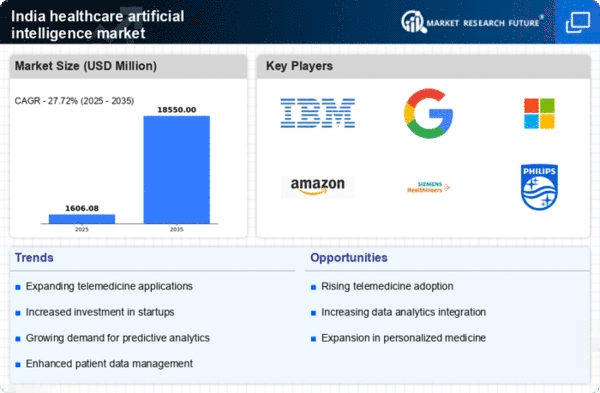Advancements in AI Technology
Technological advancements in AI are significantly shaping the healthcare artificial-intelligence market in India. Innovations in machine learning, natural language processing, and computer vision are enabling more sophisticated applications in diagnostics, treatment planning, and patient monitoring. These advancements are making AI tools more effective and user-friendly, thereby increasing their adoption among healthcare professionals. For instance, AI algorithms are now capable of analyzing medical images with accuracy comparable to that of human radiologists, which enhances diagnostic capabilities. The continuous evolution of AI technology is expected to drive market growth, with projections indicating a potential market expansion of over $2 billion by 2026. This growth reflects the increasing reliance on AI solutions to improve clinical outcomes and operational efficiencies within the healthcare sector.
Growing Healthcare Data Volume
The exponential growth of healthcare data in India is a critical driver for the healthcare artificial-intelligence market. With the increasing digitization of health records and the proliferation of wearable health devices, vast amounts of data are generated daily. AI technologies are adept at processing and analyzing this data, uncovering insights that can lead to improved patient care and operational efficiencies. The healthcare sector is expected to generate over 2.5 exabytes of data annually by 2025, creating a fertile ground for AI applications. This data-driven approach not only enhances clinical decision-making but also supports predictive analytics, which is essential for proactive healthcare management. Consequently, the healthcare artificial-intelligence market is poised for substantial growth as organizations seek to leverage data analytics to improve patient outcomes and streamline operations.
Government Initiatives and Funding
Government initiatives in India are significantly influencing the healthcare artificial-intelligence market. The Indian government has launched various programs aimed at promoting digital health and AI integration in healthcare services. For instance, the National Digital Health Mission aims to create a comprehensive digital health ecosystem, which includes the use of AI for better healthcare delivery. Additionally, funding for AI research and development in healthcare has increased, with the government allocating substantial budgets to support innovation. This financial backing is expected to enhance the capabilities of AI technologies, making them more accessible to healthcare providers. As a result, the healthcare artificial-intelligence market is likely to witness accelerated growth, with an estimated increase in market size by over $1 billion by 2027, driven by these supportive policies and investments.
Rising Demand for Personalized Medicine
The healthcare artificial-intelligence market is experiencing a notable surge in demand for personalized medicine in India. This trend is driven by the increasing recognition of the need for tailored treatment plans that cater to individual patient profiles. AI technologies facilitate the analysis of vast datasets, enabling healthcare providers to develop customized therapies based on genetic, environmental, and lifestyle factors. As a result, the market is projected to grow at a CAGR of approximately 30% over the next five years. This growth is indicative of a broader shift towards precision medicine, where AI plays a crucial role in enhancing treatment efficacy and patient outcomes. The integration of AI in personalized medicine not only improves patient satisfaction but also optimizes resource allocation within healthcare systems, thereby driving the overall growth of the healthcare artificial-intelligence market.
Increased Focus on Operational Efficiency
The healthcare artificial-intelligence market is witnessing a heightened emphasis on operational efficiency among healthcare providers in India. As healthcare costs continue to rise, organizations are increasingly turning to AI solutions to streamline processes, reduce waste, and enhance productivity. AI applications, such as robotic process automation and intelligent scheduling systems, are being implemented to optimize resource allocation and improve patient flow. This focus on efficiency is not only beneficial for healthcare providers but also enhances the patient experience by reducing wait times and improving service delivery. The market is expected to grow as healthcare institutions recognize the potential of AI to drive operational improvements, with estimates suggesting a growth rate of around 25% over the next few years. This trend underscores the importance of AI in transforming healthcare operations and delivering value to both providers and patients.
















